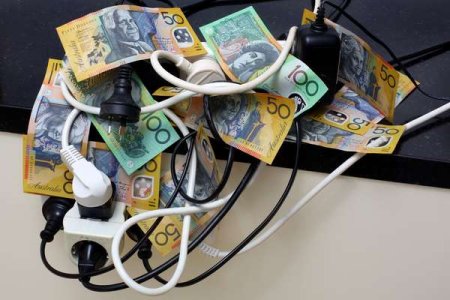Switched on savings: Shedding light on smart meters and their potential for cost cuts!
- Replies 5
As we all look for ways to tighten our belts and save a few dollars here and there, it's worth turning our attention to our household utilities.
One of the most promising tools for managing our energy consumption is the smart meter, a nifty device that's been quietly revolutionising the way Australians track and reduce their energy bills.
However, what exactly is a smart meter, and how can it help you keep more money in your pocket? Let's dive into the details and uncover the smart meter secret that could be the key to slashing your utility bills.
A smart meter is a digital device designed to provide detailed information about your energy usage in real-time.
Unlike the old 'spinning wheel' meters, smart meters send this data directly to your energy provider, ensuring that your bills are based on actual usage rather than estimates.

Smart meters have been part of the Australian energy landscape since the early 2000s, initially introduced to streamline billing processes.
However, they offer much more than just administrative convenience.
With the ability to record energy usage in short intervals—typically every five or thirty minutes—smart meters provide a granular view of when and how you're using electricity.
The Australian Department of Energy said, ‘If your premise uses a smart meter, the need for estimated readings will be reduced. However, there may be some limited circumstances in which an estimate is used.’
According to Alex St John, Policy and Research Senior Advisor of the Energy Efficiency Council (EEC), smart meters have the capability to offer instantaneous data regarding energy consumption.
‘They can tell you not only the total amount of electricity used, but also how much was used at what time,’ he said.
‘Households can then use this information to help them save energy, or better manage their energy costs.’
In the presence of solar panels, a smart meter can also track the amount of electricity that is fed back into the grid.
‘This type of information is really valuable as the power network transitions towards high levels of renewable energy,’ Mr St John explained.
‘It can help us figure out how much energy is being consumed at a household level at any given time, which helps us manage the supply-demand balance right throughout the day.’
To find out if you already have a smart meter, check your power box, usually located on an external wall or in communal areas for apartments.
If you see a digital display instead of the old mechanical dials, you likely have a smart meter.
While smart meters are now the standard for new installations across Australia, there's no requirement to replace functioning old meters.
However, as of December 2017, if your meter is faulty or due for replacement, it will be swapped for a smart meter.
Victoria has led the charge, making smart meters compulsory for residences since 2008. The Australian Energy Market Commission has proposed that all households adopt smart meters by 2030, aiming for complete implementation nationwide.
The assessment discovered that an ‘accelerated rollout would help customers reduce their household bills in the short-term and provide savings for all energy users in the longer-term’.
If you're interested in upgrading to a smart meter, contact your electricity retailer, and ensure to inquire regarding any potential recurring expenses linked to the installation process.
Dr Brendan French, Chief Executive Officer of Energy Consumers Australia (ECC), said that consumers should not incur fees for the installation of a smart meter.
‘As smart meters will benefit everyone, including the whole system, it shouldn't fall on individual customers to pay the significant installation costs,’ he explained.
‘Most consumers won't face up-front charges for straightforward installations.’
‘However, where there are associated costs, for example, if rewiring is required, governments should look at ways to step in and help customers who cannot afford them,’ he added.
For example, some services provide customers with a complimentary service to transition to a smart meter. However, supplementary expenses may arise if additional tasks are required to ensure a secure meter exchange.
According to Mr St John, households installing solar panels or a battery, needing the installation of a smart meter, might encounter a fee ranging typically between $100 and $200.
A smart meter itself won't directly cut your energy bill; however, it provides valuable insights that can lead to cost savings.
By monitoring your energy usage, you can adjust your habits to take advantage of lower rates during off-peak times, or identify energy-hungry appliances that could be used more efficiently.
Dr French highlighted that smart meters offer consumers the resources and assistance necessary to manage their energy consumption effectively and reduce their bills.
‘They help consumers save on electricity costs in a number of ways:
‘To get the most from smart meters, households need to actively engage with their energy usage to save money, which is something the vast majority of Australian households don't currently do,’ he said.
Therefore, to benefit from cost-saving features provided by a smart meter, households must adjust their habits. This entails identifying areas of high energy consumption and making adjustments to their power usage accordingly.
With a smart meter, you have the option to switch to a time-of-use tariff, which charges different rates depending on when you use energy.
By aligning your usage with cheaper rate periods, you can potentially save a significant amount on your energy bills.
Energy NSW said, ‘You can save money by using your home appliances during off-peak periods which are typically between 10 pm and 7 am, or shoulder periods (between 7 am and 2 pm) when the prices are lower.’
However, it's important to note that time-of-use tariffs might result in higher costs, particularly if the majority of your electricity usage falls within peak hours (4 pm to 8 pm).
To access the data from your smart meter, you can log onto your energy retailer's website or app.
Alternatively, you can invest in an in-home display that connects to your smart meter and shows your current energy usage and costs.
While smart meters collect detailed data, privacy safeguards are in place to protect consumers.
If you have concerns, discuss them with your energy retailer to understand how your data is handled and protected.
To save more on energy bills, you should also keep an eye on the usage of some of your appliances, particularly in the summer.
 Have you already switched to a smart meter? Did you notice any difference on your energy bills? We’d love to hear your experiences and insights in the comments below!
Have you already switched to a smart meter? Did you notice any difference on your energy bills? We’d love to hear your experiences and insights in the comments below!
One of the most promising tools for managing our energy consumption is the smart meter, a nifty device that's been quietly revolutionising the way Australians track and reduce their energy bills.
However, what exactly is a smart meter, and how can it help you keep more money in your pocket? Let's dive into the details and uncover the smart meter secret that could be the key to slashing your utility bills.
A smart meter is a digital device designed to provide detailed information about your energy usage in real-time.
Unlike the old 'spinning wheel' meters, smart meters send this data directly to your energy provider, ensuring that your bills are based on actual usage rather than estimates.

Smart meters measure electricity usage in intervals, reducing the need for estimated bills. Credits: Shutterstock
Smart meters have been part of the Australian energy landscape since the early 2000s, initially introduced to streamline billing processes.
However, they offer much more than just administrative convenience.
With the ability to record energy usage in short intervals—typically every five or thirty minutes—smart meters provide a granular view of when and how you're using electricity.
The Australian Department of Energy said, ‘If your premise uses a smart meter, the need for estimated readings will be reduced. However, there may be some limited circumstances in which an estimate is used.’
According to Alex St John, Policy and Research Senior Advisor of the Energy Efficiency Council (EEC), smart meters have the capability to offer instantaneous data regarding energy consumption.
‘They can tell you not only the total amount of electricity used, but also how much was used at what time,’ he said.
‘Households can then use this information to help them save energy, or better manage their energy costs.’
In the presence of solar panels, a smart meter can also track the amount of electricity that is fed back into the grid.
‘This type of information is really valuable as the power network transitions towards high levels of renewable energy,’ Mr St John explained.
‘It can help us figure out how much energy is being consumed at a household level at any given time, which helps us manage the supply-demand balance right throughout the day.’
To find out if you already have a smart meter, check your power box, usually located on an external wall or in communal areas for apartments.
If you see a digital display instead of the old mechanical dials, you likely have a smart meter.
While smart meters are now the standard for new installations across Australia, there's no requirement to replace functioning old meters.
However, as of December 2017, if your meter is faulty or due for replacement, it will be swapped for a smart meter.
Victoria has led the charge, making smart meters compulsory for residences since 2008. The Australian Energy Market Commission has proposed that all households adopt smart meters by 2030, aiming for complete implementation nationwide.
The assessment discovered that an ‘accelerated rollout would help customers reduce their household bills in the short-term and provide savings for all energy users in the longer-term’.
If you're interested in upgrading to a smart meter, contact your electricity retailer, and ensure to inquire regarding any potential recurring expenses linked to the installation process.
Dr Brendan French, Chief Executive Officer of Energy Consumers Australia (ECC), said that consumers should not incur fees for the installation of a smart meter.
‘As smart meters will benefit everyone, including the whole system, it shouldn't fall on individual customers to pay the significant installation costs,’ he explained.
‘Most consumers won't face up-front charges for straightforward installations.’
‘However, where there are associated costs, for example, if rewiring is required, governments should look at ways to step in and help customers who cannot afford them,’ he added.
For example, some services provide customers with a complimentary service to transition to a smart meter. However, supplementary expenses may arise if additional tasks are required to ensure a secure meter exchange.
According to Mr St John, households installing solar panels or a battery, needing the installation of a smart meter, might encounter a fee ranging typically between $100 and $200.
A smart meter itself won't directly cut your energy bill; however, it provides valuable insights that can lead to cost savings.
By monitoring your energy usage, you can adjust your habits to take advantage of lower rates during off-peak times, or identify energy-hungry appliances that could be used more efficiently.
Dr French highlighted that smart meters offer consumers the resources and assistance necessary to manage their energy consumption effectively and reduce their bills.
‘They help consumers save on electricity costs in a number of ways:
- Smart meters mean people can see how much energy they're using without having to wait three months for their electricity bill;
- Having access to frequent data allows consumers to adapt their energy use to benefit from cheaper electricity periods;
- Bills from energy retailers would be more accurate, doing away with estimates;
- Having access to their electricity use data means households and businesses have the necessary information to find the best energy deal.’
‘To get the most from smart meters, households need to actively engage with their energy usage to save money, which is something the vast majority of Australian households don't currently do,’ he said.
Therefore, to benefit from cost-saving features provided by a smart meter, households must adjust their habits. This entails identifying areas of high energy consumption and making adjustments to their power usage accordingly.
With a smart meter, you have the option to switch to a time-of-use tariff, which charges different rates depending on when you use energy.
By aligning your usage with cheaper rate periods, you can potentially save a significant amount on your energy bills.
Energy NSW said, ‘You can save money by using your home appliances during off-peak periods which are typically between 10 pm and 7 am, or shoulder periods (between 7 am and 2 pm) when the prices are lower.’
However, it's important to note that time-of-use tariffs might result in higher costs, particularly if the majority of your electricity usage falls within peak hours (4 pm to 8 pm).
To access the data from your smart meter, you can log onto your energy retailer's website or app.
Alternatively, you can invest in an in-home display that connects to your smart meter and shows your current energy usage and costs.
While smart meters collect detailed data, privacy safeguards are in place to protect consumers.
If you have concerns, discuss them with your energy retailer to understand how your data is handled and protected.
To save more on energy bills, you should also keep an eye on the usage of some of your appliances, particularly in the summer.
Key Takeaways
- Smart meters are digital devices that measure electricity usage in intervals, and automatically transmit data to energy retailers, potentially reducing the need for estimated bills.
- Households can use smart meter data to manage their energy costs, and, in the case of solar panel owners, monitor electricity exported to the grid.
- Since December 2017, national rules in Australia mandate that all new and replacement meters must be smart meters, with Victoria requiring them for all residences since 2008.
- Smart meters can help consumers save money by providing detailed energy usage data, allowing for adjustments in energy consumption and more accurate billing.







